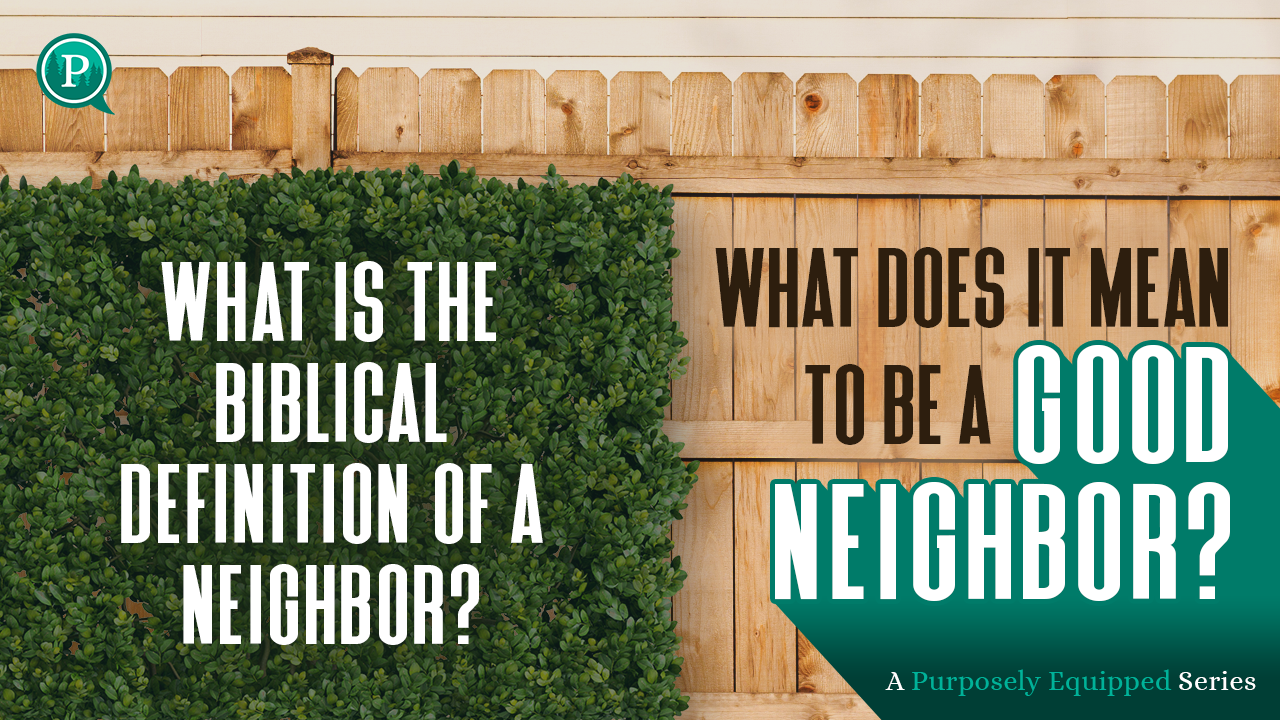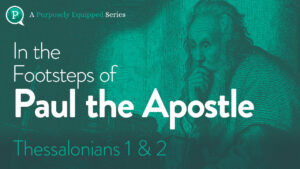What does it look like to love our neighbors? What does the Bible have to say about this? Who is our neighbor? Who isn’t? And what should we do once we know the answer to those questions?
Today begins a new series here on Purposely Equipped, and we’re diving into how we can learn to be a good neighbor! What does this mean Biblically and how can we follow what the Bible says? Jesse Bradley and his team at Grace Community Church in Auburn, Washington join us for this new 5-part series. Let’s get started!
Show Notes:
Find Pastor Jesse Bradley: Online | Instagram | Facebook | Twitter
Find Grace Community Church: Online | Instagram | Facebook | Twitter | YouTube
Transcription:
Purposely; Your life, God’s Purpose. Listen at onpurposely.com.
Narrator:
Welcome to Purposely Equipped. We want to help you go deeper in your faith by learning truth from the Bible, our new series, What Does it Mean to be a Good Neighbor? will help you discover what the Bible has to say about how we treat and love those around us. This is a practical podcast where we’ll learn together what God desires of us. For this series, we are joined by Pastor Jesse Bradley of Grace Community Church in Auburn, Washington.
Jesse Bradley:
Welcome to the Purposely Equipped Podcast, and my name is Jesse Bradley. I’m the lead pastor at Grace Community Church, and in this series we’re focusing on loving your neighbors. Now we have five questions. I’m going to give you an overview for this series. And first question, one question for each episode, what is the biblical definition of a neighbor? Second, what has God called you to do as a neighbor? The third question, what is faithfulness to God look like? And the fourth question, how can you get started with outreach? The fifth question, what is God doing in the Pacific Northwest? We’re going to dive deep in these topics and in these conversations we’re going to go into scripture. We’re going to look at what God says. This is a practical series. It’s to empower and encourage you to live out your faith. We’re doing this together and we’re not presenting this.
We have all the answers or we know everything. No, not at all. We’re on an adventure. We’re all learning. We’re lifelong learners and we hope that this leads to more conversations. In this series. I’m going to be hosting and leading, and then also there’s people from our team here at Grace Community Church. Leroy is one of our worship leaders. Then Melanie leads our international student ministry, and also Wayne is our outreach pastor. So you’re going to hear different perspectives and stories. We’re so glad you’re taking time to join us. We want to grow in our faith together, and we are excited about what God does in our lives when we seek him, when we say yes to him. And being honest, this is one area where so many followers of Jesus struggle. This stretches all of us because without God sometimes we can be cautious and selfish and not really value and love the people around us.
And to take relationship risks and to enter in, we need God’s help. And this is a series where we’re going to be honest, transparent about some things that are working well, ways that God’s moving, and also some things that we’ve struggled with. And I think for all of us, this is a stretch. Like I say, it can be the most difficult part of following Jesus is really loving your neighbors well. So that’s the overview. Let’s the first question today, what is the biblical definition of a neighbor? And Leroy, I’m going to let you start. As you think through what that means, neighbor and that word, you’ll see it often throughout the Bible. What is God’s heart? What is the meaning that someone is your neighbor?
Leroy:
Yeah, so in Matthew 22, verse 39, it says the greatest commandment is to love your neighbor as yourself. And I looked that up in the Greek and what it means, it means to be a near friend, a close friend. And when I did that, I reminded, I was reminded of a time where I was a foster kid in San Marcos, California. I was with not great foster parents. They were just not the nicest to me and to a lot of other people, some of them, the mother was actually really, really nice. But I had a neighbor that was two houses down and they were an elderly couple and they loved God so much, and they came through for me all the time when I had nightmares, when I had arguments with some of the children that were actually not foster kids in that home, they were just so near, they weren’t like Temecula, they weren’t an hour away.
They weren’t in the Pacific Northwest, they were near to me. They were a friend to me. And this guy in his garage, he had a model railroad train, and it was a perfect city. He had grass, he had gravel and all that stuff. And he had this train that actually he could control. And he taught me my identity in Christ with that. He’s like, listen, this is you, and sometimes you’re going to go through trial, sometimes you’re going to be right on this train track. Sometimes this train’s going to go past. And it was just like, oh my goodness. And here I am as a middle school kid, not really understanding what he’s saying, but there’s so much of that that has really impacted my life to this day, just from having a near neighbor, a near friend. And so that’s kind of my, I think biblical definition of what a neighbor is and should look like.
Jesse Bradley:
Love that story and that experience. Yeah, because when someone treats you like a neighbor, yeah, they value you. They care about you. Amen. Yeah. They welcome you in because relationships about closeness and yeah, I like the scripture you started with. When we think about what is the greatest commandment, Jesus says, love your God with all your heart, strength, soul, and mind. And then the second, love your neighbor as yourself. And we live in a world that’s confused about love. And then Jesus brings the vertical and the horizontal together. Yes. And so first, we’re in this loving relationship with God, but that’s not independent or mutually exclusive of the people around us and how we treat them and connect with them. So out of that relationship, then there’s an overflow, and now we’re going to love other people as we love ourselves. Absolutely. And in that combination, do we love ourselves? Well, yes. It says it right there. We’re all made in God’s image and we’re all wonderfully made, but we love our neighbor just as we love ourself, which is the harder part. Yeah. And so in terms of loving other people and loving the neighbors around us, for you as a worship leader, you’re always helping people connect vertically with God. How does worship go so far beyond just one hour, one building one day? And how does that relate worshiping God? How does that relate to loving your neighbor?
Leroy:
Yeah, so I think a true form of worship is just really where your heart’s at. It’s just true obedience. And so if I want to love you, I’m going to obey God. I’m not just going to obey you. I’m going to obey God. And so it’s not necessarily just a song, it’s not a light show, it’s not a fog machine, it’s not chords. It’s just my obedience to almighty God. And if I want to love him, I’m going to obey him. If I want to love you, I’m going to obey him. If I’m going to love my neighbor, I’m going to obey him. And so I think as worship leaders, sometimes we get stuck in this like, oh, we should do this song, we should do it this way, whatever. Or when we really could just kind of quiet down and just say, Lord, how can I obey you in this season, in this worship set list on this Sunday for Easter, whatever it is.
And then that’s how we affect God’s people, whether it’s inside a church congregation or outside. No matter what we’re doing, we’re just purposely on purpose trying to obey him. And I think that’s how we affect people honestly. It has to be our relationship with him, because then it’s in Galatians, it says, if I still seek to serve you, I’m not a bond servant. And so if I’m trying to disobey you, if I’m just trying to just be led by you and not necessarily by the Lord, even though we understand leadership and all that, but if I’m obeying God in wanting to love you, that I’m going to love you well,
Jesse Bradley:
That’s it. And really what we’re setting up as we talk about this definition of a neighbor, we’re setting up kind of a full context where neighbor and defining neighbor starts with worship. Because when we abide with Jesus, we’re going to love other people. And we can’t say we love God if we’re not really loving our neighbors. And of course, some people want to get into the specifics. And I love your story too, because you know can describe it in words, the definition, but you also know when you experience it. Yeah. So that’s what we’ve touched on. And I know there’s some people listening right now that say, but really hone in now. Sure. Who is my neighbor who isn’t? And Jesus told the story of the Good Samaritan, and the question came up, who is my neighbor? And he unpacked it. And the way he did it, it was not just a definition that was information.
I think it was a story to lead to transformation. And it was surprising because you have these religious people who stay on the other side, and it’s the one you don’t expect. It’s the Samaritan that’s actually going to cross the street. And the religious people might give a good sermon on loving a neighbor. They might have an accurate definition in the temple of loving the neighbor, but when it actually comes to the person across the street, they stay on the other side. And it’s easy to just talk this. Have a podcast about it, but then not live it. Amen. For all of us and the Samaritans actually the example. And all of us can get in that trap of, well, it’s a risk to cross the street. Well, it’s going to take up some of my time and energy. Well, I’m busy. We can rationalize. I’ve got other things to do. And all those excuses get piled up. And sometimes we live a little more isolated. We live in a retreat mode instead of a connect mode. And what do we learn from what Jesus is saying? How does that definition challenge us from that parable?
Leroy:
Sure. I think you’re saying it absolutely right, where it has to be something where it’s not just we’re a hearer of the word, where we will actually put into action the things that we’re gleaning from it. I’m reminded by just this most recent Sunday in a worship service where there was a moment that we kind of set up to be a little bit spontaneous. But as I’m leading into the second service, there was just a moment where I just kind of start saying, Hey, we’re going to sing this song, fight my Battles. And I just came to mind, Hey, we’re going to fight for marriages. We’re going to fight for sons and daughters to come home. We’re going to fight for peace in our mind. And I kind of had to be obedient in that moment. And the response from a lot of people in church was like, wow, I really needed that.
And it just goes to, I can’t just think, go backstage and pray about it. Sometimes I need to proclaim it in front of people. Sometimes I need to go give my neighbor a cup of sugar. Or sometimes I need to say, Hey, you know what? I’m praying for your marriage, but I’m actually praying for it. I’m not just going to say it. So I think we’re on the right track there. It’s not just like, Hey, I heard it. I’m going to be a doer of the word. I’m going to actually love you in action, not just in word. That’s right.
Jesse Bradley:
That’s right. And again, going back to worship, that’s where we received from the Lord. We get filled up with his presence. Yes. His love. That’s where battles are one. Amen. Because God sets our heart in a new direction, a new trajectory. And when Jesus is talking about neighbor and we’re processing the definition of neighbor, I think there were a lot of religious people who had a very narrow definition of neighbor. And then Jesus would break the cultural norms. He would welcome the children when they were seen a second rate in the culture. Or women, sadly were seen a second rate. And what is he doing? He’s connecting with the women. He’s going and breaking down the walls between Jew and Samaritans. And he’s there with a woman by the well who’s been married several times. He’s a friend of sinners. And all of a sudden what’s happening is he’s unpacking that neighbor really means whoever’s around you.
Whoever God’s place in your path. And we live in a time right now where we’re more connected than ever on our phones. Our neighbors can be in the other side of the world, but we’re direct message watching a video, we’re sharing something, we’re on FaceTime together, and all of a sudden our neighbors, whether it’s local or global, it’s whoever God brings in your path. Yeah. Love that person. And even go out of your way, break the cultural norms. And neighbor defining a neighbor is going to mean more love than we would naturally have because we’re going to see people the way God sees people. And so as we start to conclude, what is a definition of a neighbor? I think some pieces we’re touching on is that it really starts with worship with God and it’s vertical and out of that richness, now there’s an overflow where we start to love people like we love ourselves, our neighbors, our simply, whoever God brings along in our path.
And like you say, there’s a drawing near a friendship, a fellowship. There’s a kinship that happens, there’s a love with bonds. And take initiative, take the risks. Those are all components. And let’s let the Bible define what neighboring really is and who a neighbor is versus just what’s the norm at our church? What’s the norm in our culture? Because we live in a culture where there’s a lot of division and a lot of people want to say, well, I’m not going to talk to them because they don’t agree with me politically. They don’t look like me from a different denomination. They don’t believe what I believe. They reject Jesus, so I’m going to reject them. Well, we need to come back to Jesus and start to see people the way he does and what the Bible says about a neighbor.
Leroy:
Amen.
Jesse Bradley:
Yeah. So anything you want to add to encourage people is they maybe rethink what does the Bible actually say about who our neighbors are and what that means. You said it so well, let’s be doers of the word. That definition includes action. That in loving our neighbors too. Yeah. Any final encouragement you want to add?
Leroy:
Yeah. One practical thing is that as Christians, we always say, Hey man, I’m going to pray for you. I’m going to pray for you. My encouragement is practically would just be pray with them. Not just pray for them but pray with them. Let’s seek God together. I guess. So the second one would be, let’s get more in the face of people. We have Bible studies at our houses. We have game nights at our houses. Let’s not just be the neighbor, let’s be neighborly, let’s love actually, let’s love together. Sit at a table and eat instead of just, I get it. There’s some people that are in China that can’t come and do that. That’s FaceTime you’re talking about. But if you can come over to my house, let’s be neighbors, let’s be friends. Let’s love on each other purposefully.
Jesse Bradley:
Great peace there. Not just pray for but pray with. Yeah. Yeah. And not just be next to but face to face, not just side by side. Yeah. That’s living it out. Because when we do that, then the neighboring, the neighbor really feels like a friend and the gap starts to disappear. Yeah. Because we’re entering in.
Leroy:
I have one last thing at the last Bible study that we had, my mentor came and a lot of the people that there are part of the worship team, and he said this line to me he’s like, man, you guys are really close. I was like, yeah man, we bond really well. And he says, you don’t bond on the stage. You don’t just bond by playing guitar and all that stuff with people. Yeah, sure. You bond as like a band, but as a team he says, you bond here and then the bond that you have is witnessed from the stage. So we bond by having come over here and having someone cry and say, Hey man, I’m really going through it. And we get to pray with him or we’re laughing and we’re, we’re competitive during games. We’re loving each other in action, on purpose, in real life with each other. And then that bond is grown there. Not just because we’re a part of the same worship team or a part of the same church or a part of the same faith. Yes. It’s like I grow with you. I grow with any of the other people that are going to be on this podcast today. I grow with them by actually doing life with them.
Jesse Bradley:
That’s great. The bond grows and that’s what it means to be a neighbor, is to develop that bond. Even if it’s inconvenient, even if there’s a cost involved, even if` it’s someone who’s hurting and can’t give back. And for our going deeper from this first section, check out Luke chapter 10 and read through the Parable of the Good Samaritan and write down what is the definition biblically, what does Jesus say about being a neighbor? And then let’s go and do likewise, not just study the word, 1t episode and our next question for the next episode, what has God called you to do as a neighbor? We’ve started to go there. We’re going to dive in. So let’s keep going together in this whole series five episodes, five questions, Loving Your Neighbors.
Narrator:
Special thanks again to our hosts from Grace Community Church in Auburn for their help with this series. And thank you for downloading What Does it Mean to be a Good Neighbor?, A Purposely Equipped series. Let’s keep growing in our faith together. Purposely Equipped is part of Purposely, a podcast network with practical podcasts to help you find and live in God’s purpose for your life. Find more podcasts and faith resources at onpurposely.com.
Follow this podcast:







